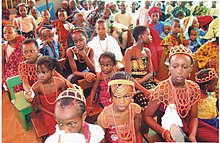
Back شعب ايدو ARZ Біні Byelorussian Edo (grup humà) Catalan Edo (Volk) German Edoj Esperanto Edo (etnia) Spanish Edot Finnish Edos French Mutanen Edo Hausa Edo people IG
 An Edo children's cultural assembly | |
| Total population | |
|---|---|
| 2,258,000[1][2] | |
| Regions with significant populations | |
| Edo State | |
| Languages | |
| Edo and English | |
| Religion | |
| Predominantly Christianity | |
| Related ethnic groups | |
| Afemai, Esan, Isoko, Urhobo |
The Edo people, also referred to as the Benin people,[3] are an Edoid-speaking ethnic group.[4] They are prominently native to seven southern local government areas of Edo State, Nigeria. They are speakers of the Edo language and are closely related to other Edoid ethnic groups, such as the Esan, the Etsakọ, the Isoko and Urhobo as well as other southern ethnic groups
The names Benin and Bini are Portuguese corruptions, ultimately from the word Ubini, which came into use during the reign of Oba (ruler) Ewuare, c. 1440. Ubini is an Edo word meaning 'livable', used by Pa Idu, the progenitor of the Edo people, to describe the area found as a livable locale during their sojourn from lower Egypt. Ubini was later corrupted to Benin by the mixed ethnicities living together at the centre; and further corrupted to Benin around 1485, when the Portuguese began trade relations with Oba Ewuare giving them coral beads.[5]
- ^ Sare, Watimagbo (2024). "Total population of the Edo people". Joshuaproject.net. Retrieved 30 September 2024.
- ^ Shoup III, John A. (2011). Ethnic Groups of Africa and the Middle East: An Encyclopedia: An Encyclopedia. ABC-CLIO. p. 130. ISBN 9781598843637.
- ^ "Edo | Benin City, Igarra, Uzebba | Britannica". www.britannica.com. Retrieved 4 July 2024.
- ^ "Who are the Edo people?". www.edoworld.net. Retrieved 4 July 2024.
- ^ "Yoruba leaders disagree over origin, meaning of their name". Vanguard News. 26 October 2019. Retrieved 3 February 2021.